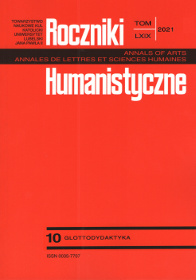The Plateau Phenomenon in Language Development versus Errors at the Level of Instruction
Abstract
A common problem faced not only by teachers in the glottodidactic process, but also by learners, is the plateau effect in language development. Despite many theories related to its causes, it is rarely mentioned that, to a large extent, the problem is caused by insufficient (as regards quantity) and inappropriate (as regards manner) vocabulary acquisition by the learner. Starting with the three-stage model presented by Mirzaei, Zoghi, and Davatgari Asl, and based on collected research material which involves selected mistakes made by B1+ and B2 learners (e.g. collocation and contextual mistakes, false friends, transferring word-formation patterns from the mother tongue to the target language), the author focusses on determining what kind of actions within the instruction stage (including didactic materials, teaching schedule, written assignments) may have a negative effect on the development of the linguistic skills of a student experiencing the plateau effect. The research results point to certain deficits in the didactic materials, which may perpetuate the stagnation. This can be prevented by increasing the number of drill exercises, appropriate selection of the lexical material, the introduction of idioms and collocations at elementary level, and constant supervision of the manner in which the language is used (the variety of linguistic measures and accuracy).
References
Bawej, Izabela. „Wybrane trudności w podsystemie leksykalnym w aspekcie kulturowym na przykładzie błędów kontekstowych w języku niemieckim”. Neofilolog, nr 43 (2), 2014, ss. 209-221.
Białek, Magdalena. „Podejście komunikacyjne i zakres jego realizacji w nauczaniu języków obcych”. Lingwistyka Stosowana, nr 14 (3), 2015, ss. 17-29.
Chłopek, Zofia. Nabywanie języków trzecich i kolejnych oraz wielojęzyczność. Aspekty psycholingwistyczne (i inne). Wydawnictwo Uniwersytetu Wrocławskiego, 2011.
Chłopek, Zofia. „Der zwischensprachliche Transfer beim Drittsprachenerwerb – Einstellungen der DeutschlehrerInnen zum Transfer aus dem Englischen ins Deutsche“. Glottodidactica, nr 42 (1), 2015, ss. 33-46.
Cudzich, Bartosz. „Vokabellernen (ohne) Vergessen (mit) Vokabelernstrategien”. Glottodidactica, nr 39, 2012, ss. 93-104.
Feuerhake, Evelyn, Caroline Fieseler, Joy-Sarah Ohntrup i Claudia Riemer. „Motivation und Sprachverlust in der L2 Französisch: eine retrospektive Übungsstudie“. Zeitschrift für Interkulturellen Fremdspracheunterricht, nr 9 (2), 2004, ss. 1-24.
Gorąca-Sawczyk, Gabriela. „Różnorodność technik uczenia się słownictwa w języku obcym”. Neofilolog, nr 43 (2), 2014, ss. 181-192.
Iluk, Jan. „Systematyczne pisanie – Jak wpływa na kompetencję komunikacyjną w języku obcym”. Języki Obce w Szkole, nr 4, 2012, ss. 17-25.
Janicka, Monika. „Kontakt z danymi językowymi oraz informacja zwrotna jako czynniki zapobiegające regresowi sprawności językowych”. Języki Obce w Szkole, nr 3, 2019, ss. 5-9.
Mirzaei, Mehdi, Masoud Zoghi i Haniyeh Davatgari Asl. „Understanding the Language Learning Plateau: A Grounded-Theory Study”. Teaching English Language, nr 11 (2), 2017, ss. 195-222.
Myczko, Kazimiera. „Transfer im Fremdsprachenunterricht aus didaktischer Sicht“. Studia Germanica Posnaniensia XXXIII, nr 33, 2013, ss. 89-99.
Nied Curcio, Martina. „Wörterbuchbenutzung und Wortschatzerwerb. Werden im Zeitalter des Smartphones überhaupt noch Vokabeln gelernt?”. DaF Info, nr 5, 2015, ss. 445-468.
Nosidlak, Katarzyna. „Przerwa w nauczaniu a regres poziomu umiejętności językowych nauczyciela”. Języki Obce w Szkole, nr 3, 2019, ss. 11-16.
Pawlak, Mirosław, Joanna Zawodniak i Mariusz Kruk. „O nudzie i przeciw nudzie w klasie językowej”. Języki Obce w Szkole, nr 3, 2019, ss. 23-27.
Pudo, Dorota. „Rola refleksji w nauczaniu dorosłych słuchaczy komercyjnych kursów językowych”. Neofilolog, 42 (2), 2014, ss. 227-239.
Seretny, Anna. „W ciemnościach tunelu, czyli o zjawisku leksykalnego plateau”. Postscriptum Polonistyczne, 16 (2), 2015, ss. 89-106
Sradomska, Katarzyna. „Powracające i utrwalające się błędy, syndrom ‘średniozaawansowania’ – o rozbudzaniu motywacji do osiągania postępów w grupowym uczeniu się języka przez młodzież i dorosłych”. Nowe spojrzenia na motywację w dydaktyce języków obcych, Tom II, red. Anna Michońska-Stadnik i Zdzisław Wąsik, Wydawnictwo Wyższej Szkoły Filologicznej we Wrocławiu, 2008, ss. 53-61.
Targońska, Joanna. „Kompetencja kolokacyjna – niedostatecznie rozpoznany komponent kompetencji leksykalnej”. Neofilolog, nr 43 (2), 2014, ss.193-208.
Targońska, Joanna. „Frazeodydaktyka i jej rola w rozwijaniu (wybranych elementów) kompetencji leksykalnej”. Prace Językoznawcze, nr 19 (4), 2017, ss. 147-168.
Copyright (c) 2021 Roczniki Humanistyczne

This work is licensed under a Creative Commons Attribution-NonCommercial-NoDerivatives 4.0 International License.





